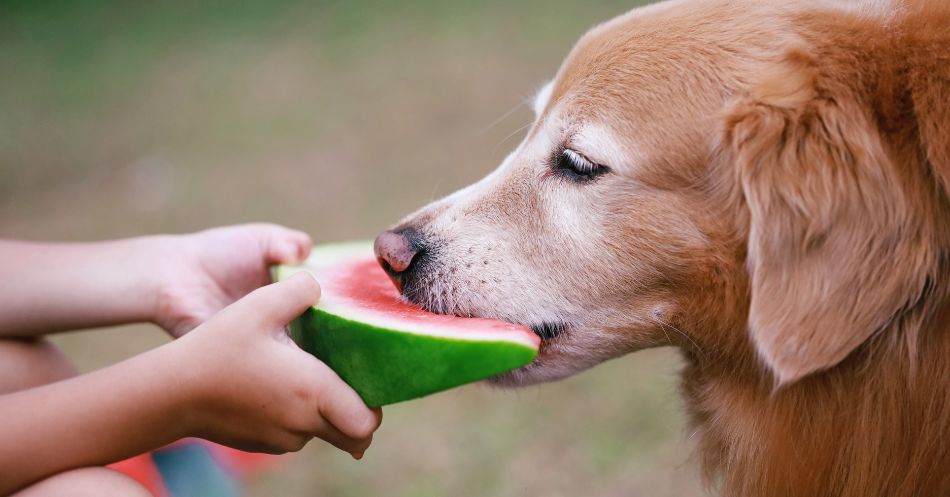
Can Dogs Eat Watermelon?
In the heat of summer, nothing sounds better than a sweet, juicy slice of fresh-cut watermelon. Watermelon is refreshing, tasty, and a perfect snack any time of day.
If you’re wondering, “Can dogs eat watermelon?” because you don’t want your furry friend to miss out on this juicy fruit’s deliciousness, we’ve got good news. Dogs can eat watermelon, though, like with every other fruit and vegetable, there are some precautions to take.
Before you start prepping some watermelon for your dog, let’s explore everything you need to know about feeding your dog this healthy treat. We’ll touch on the benefits of watermelon for dogs, how much watermelon is safe for dogs, the potential hazards of this refreshing treat, and more.
Pin Me Now, Read Me Later!

Is It Safe for Dogs to Eat Watermelon?
The short answer is yes. Watermelon can be a healthy treat for dogs. It’s low in calories, high in vitamins A and C, and also keeps them hydrated because of its high water content. Watermelon is primarily composed of water (91%), followed by carbohydrates (7.5%), and trace amounts of other nutrients such sugar, protein, fiber and fat. When feeding your dog watermelon, remember to remove the seeds and the rind as they can cause gastrointestinal blockage.
Always introduce new foods in small amounts to see how your dog reacts to it, as some dogs might be allergic. Be aware that too much watermelon might lead to diarrhea or symptoms of an upset stomach.
What Are the Benefits of Giving Your Dog Watermelon?
At Pet Living, we love feeding our dogs the occational treat of whole fruits because of the rich vitamins and minerals they offer. Several health benefits come from giving your dogs watermelon. These include the following:
Vitamins and Minerals
Watermelon is chock-full of vitamins A, B6, and C. These are critical for your dog’s eye and skin health, nerve function, iron absorption, and they also boost the immune system.
Potassium
Potassium is an essential electrolyte that gives dogs the energy to play all day and maintain hydration. It also helps the heart, nerves, and muscles function properly.
Fiber
Fiber supports your dog’s digestive tract and helps prevent diarrhea and other digestive issues. Dogs with a good amount of fiber in their diet are typically within a healthy weight range and have normal blood sugar levels.
Hydration
Staying hydrated is vital to your dog’s health. Particularly in the hotter months, encouraging your dog to drink as much water as needed can be tricky. Adding fresh or frozen watermelon to their diet can help!
The fruit is made up of 91% water, making it a great way to supplement your dog’s water intake.
Low Calorie
One cup of watermelon contains just 46 calories, making it a refreshing and low-calorie snack that is also a great treat for when you’re trying to maintain or reduce your dog’s weight!
What Are the Risks or Disadvantages of Giving a Dog Watermelon?

Chilly eating some juicy watermelon chunks.
Watermelons, including seedless watermelons, are high in sugar. A cup of watermelon contains 9.42 grams of sugar. Too much watermelon can contribute to the risk of obesity and diabetes in your dogs. If your dog has a sugar sensitivity or is on a diet to lose weight, watermelon may not be the best fruit to serve regularly. Try strawberries, raspberries, or blueberries instead.
This fruit’s risk also lies in its seeds and rinds. The watermelon rind is the thick green outer layer that you cut into when preparing the tasty treat. It’s unsafe for dogs to consume because it can cause a blockage in their intestines. If ingested and improperly chewed, a watermelon rind can become a choking hazard.
The black seeds in fresh watermelon are easy to spot and can be removed to prevent your pup from eating them. Fortunately, you can buy a seedless watermelon instead to avoid your dog eating any watermelon seeds accidentally.
Watch for the following symptoms if you think your dog may have eaten too much watermelon:
- Appetite loss
- Discomfort
- Fatigue
- Gulping
- Vomiting
- Diarrhea
- Blood in their vomit or stool
If you notice any of these changes, contact your veterinarian immediately.
How Can Dogs Eat Watermelon Safely?
Buy seedless watermelons so you can save yourself the trouble of removing all the seeds and lower the risk of your dog swallowing them.
If you’re going to feed your dog a slice of watermelon, don’t hand-feed it to them with the watermelon rind still on. Cut it into pieces or cubes so they don’t accidentally eat the rind while enjoying their refreshing treat
What’s the Best Part of Watermelon for Dogs?
The red, juicy meat is the best and, more importantly, the only part of the watermelon for your dog to eat. Made of nearly all water, the red flesh of the watermelon is rich in vitamins, minerals, fiber, potassium, and more.
How Much Watermelon Can I Give My Dog?
Feeding your dog watermelon all depends on the size and health of your dog. Be sure to consult your veterinarian before adding watermelon treats to your dog’s diet to ensure you’re giving them the proper amount.
It’s also important to remember that while dogs can eat watermelon, treats and snacks should only make up 10% of their daily diet. The rest should come from their dog food.
Here’s the standard recommendation of watermelon for dogs, based on size. A “slice” should measure roughly 1 inch x 1 inch and be about ¼-inch in thickness, says PetMD.
| Dog Size | Recommended Watermelon Slices |
| Miniature dogs | 1–2 slices of watermelon |
| Small dogs | 2–3 slices of watermelon |
| Medium-sized dogs | 5–6 slices of watermelon |
| Large dogs | A handful of watermelon slices |
| XL dogs | A handful, up to half of a medium-sized watermelon |
How Often Can Dogs Eat Watermelon?
Dog parents may be tempted to feed their dogs watermelon on a daily basis because the fruit is low-calorie, low-sodium, and cholesterol-free.
Your veterinarian may recommend how often your dogs can eat watermelon, and he or she will also recommend the proper amount. Human food can have different effects on dogs, so slowly introducing new foods is best. Every dog is unique and may react differently to any new food.
What Breeds of Dog Can Eat Watermelon?
Unless otherwise specified by your veterinarian, any breed of dog is safe to eat both red and yellow watermelon. Because watermelon is mostly made up of water, it’s an excellent treat for a boost of hydration in your dog’s diet.
If you’re wondering whether your puppy can enjoy watermelon like adult dogs, the answer is yes, but make sure to take the necessary precautions we mentioned earlier.
Are Dogs Allergic to Watermelon?

The majority of dogs don’t have an allergy to watermelon. Yet, while uncommon, some dogs might be allergic to it. When introducing watermelon to your pup, start with small quantities, about one small slice about an inch thick. Then, watch them closely for the rest of the day to see how their body processes the fruit. Keep in mind that dogs process food in a way that’s distinct from humans.
If your dog eats too much watermelon, they can become ill from the sugar content in the fruit. Too much of any fruit can lead to digestive problems (e.g., constipation, diarrhea, etc.) and other health problems.
It’s best to introduce the fruit slowly to your dog’s diet to determine if they can eat watermelon and enjoy the summer snack with you.
Can Dogs with Medical Conditions Eat Watermelon?
If your dog is obese, diabetic, or has a sugar sensitivity, you should probably hold off on feeding them watermelon treats. If they are on a particular diet, the natural sugars in watermelon (and most fruits) can harm their overall health.
If your dog has just had surgery or has any other medical conditions, consult a veterinarian before feeding them watermelon (or any other new foods).
What Are Some Dog Treat Ideas with Watermelon?
Now that you know everything there is to know about safely feeding your dog watermelon, here are some simple and fun ways to present the tasty fruit to your dog in fresh and frozen watermelon form.
Sliced
Cut one-inch slices of fresh or frozen watermelon and let your dog eat from your hand or in their bowl.
Mashed in a Toy
Mash up some frozen watermelon and put it inside one of their toys like you would using peanut butter or ice.
Fruit Smoothie
Blend watermelon with blueberries, bananas, and other fruits for a refreshing snack. Freeze the smoothie to make ice cubes or popsicles, or pour it over their meal, keeping in mind the proper portion for your dog’s size.
Dehydrated
Create watermelon jerky by cutting it into strips and dehydrating it in your oven or with a food dehydrator. These are perfect chewy after-meal snacks that won’t make a mess. However, give smaller portions than you would with fresh watermelon, as dried fruit often have a higher or more concentrated sugar content.
The Final Woof on Watermelon
So, can dogs eat watermelon? They sure can, but, like with any other treats, with some precautionary measures.
Watermelon should be enjoyed in appropriate quantities that depend on your dog’s weight and overall health. Always check with your veterinarian before introducing new foods, and avoid feeding your dog watermelon rinds or seeds.
Otherwise, watermelons are safe for dogs and can be enjoyed as a nutritious treat all year round. What’s your favorite way to feed your dog watermelon? Leave us a comment!







Comments (0)